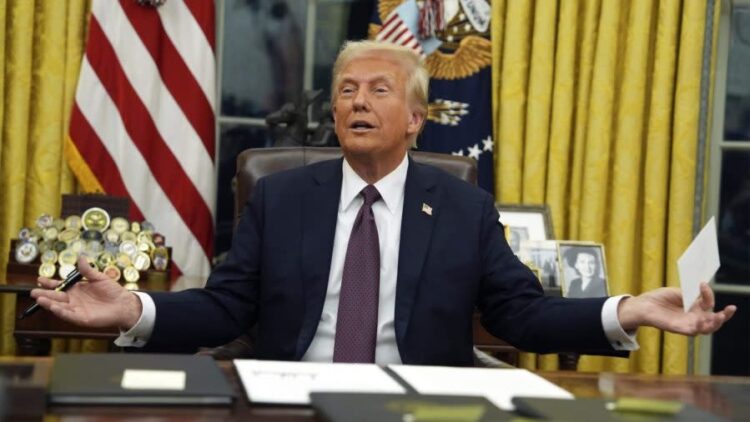In early April 2025, President Donald Trump’s administration announced significant tariff measures that sent ripples through the cryptocurrency markets. President Trump signed an executive order imposing a minimum 10% tariff on all U.S. imports, effective April 5. Higher tariffs, ranging from 11% to 50% on imports from 57 countries, were initially scheduled for April 9 but were suspended for 90 days for all except China.
The announcement led to immediate crypto market volatility. CoinMarketCap revealed that between April 3 and 4, Bitcoin (BTC) dropped by 2.67%, falling from $83,909 to $81,670. It continued to decline, losing another 8.86% and reaching $74,436 by April 7.
Ethereum (ETH) followed a similar trend. ETH’s price fell 4.56%, from $1,844 to $1,760 between April 3 and 4, then dropped significantly by 19.60%, reaching $1,415 on April 7.
The tariffs announcements increased fears of a global economic slowdown. This sentiment led investors to liquidate riskier assets, including cryptocurrencies. The crypto market experienced one of its largest liquidation events, with total liquidations exceeding $2.2 billion within 24 hours.

The immediate declines suggest that, in times of acute market stress, investors prioritize liquidity and risk reduction over traditional hedges.
Reversal Sparks Rally: The Power of Political Signals
On April 9, 2025, President Donald Trump hinted at suspending tariffs on key imports, triggering a swift market rebound. The announcement led to a significant crypto market rally.
According to CoinMarketCap, between April 9 and 10, BTC saw a 10.88% increase, rising from $74,589 to $82,700. It continued to climb, gaining another 4.01% to reach $86,015 by April 13.
ETH also made gains. Its price rose 6.35%, from $1,386 to $1,474 between April 9 and 10, and then increased by another 14.60%, reaching $1,689 on April 14.
The suggestion of suspending tariffs helped ease investor worries about a global economic slowdown. Markets reacted positively, showing how sensitive they are to macroeconomic signals.
The quick market rebound highlights how much political signals can affect investor sentiment. Even small hints of policy changes can lead to big market movements, showing how important political developments are in shaping economic expectations.
What This Tells Us About Macroeconomics and Crypto
Broader economic trends, such as inflation, interest rates, and trade tensions, increasingly influence cryptocurrencies like Bitcoin and Ethereum.
On one hand, crypto is still seen as a risky investment, reacting to big economic events, like trade tensions or rising inflation, with dramatic price swings. This shows that people still view crypto as speculative, with prices often following stock market trends during uncertain times.
On the other hand, Bitcoin is viewed by some as a hedge against inflation, offering protection if the value of traditional money falls. However, its volatility makes it less reliable compared to safer assets like gold.
Global economic events don’t just affect stocks; they can impact crypto too. For example, trade wars can create market uncertainty, causing crypto prices to drop. However, if tensions ease, as with hints of tariff suspension, Bitcoin can surge as risk perceptions change.
Regulations also play a role. Changes in government policy can shake up the market, but crypto tends to react more to uncertainty than actual policy shifts. If there’s significant economic uncertainty, prices can swing wildly, even before anything happens.
Overall, the link between crypto and macroeconomic factors highlights how much global events shape the digital asset world, with the market reacting strongly to trade disputes, inflation concerns, and government policies.
This shows that crypto markets don’t operate in a vacuum; they’re deeply connected to the same economic forces that move traditional finance.
Investor Psychology and the Narrative Economy
Investor psychology often drives crypto market movements more than traditional financial fundamentals. In periods of high crypto market volatility, news and social media buzz can cause significant price swings, even if the cryptocurrency’s intrinsic value hasn’t changed.
Speculation plays a key role, with many investors buying based on price expectations rather than asset value, leading to rapid price fluctuations. Retail investors are also influenced by momentum and social media trends.
Studies have shown that increased investor attention correlates with higher returns and greater crypto market volatility. This means that as more people talk about a particular cryptocurrency, its price is likely to become more volatile.
For both individual and institutional investors, managing risk amid this political and social noise is crucial. This involves thorough due diligence, understanding the factors that influence market sentiment, and being prepared for sudden price movements.
The Bigger Picture: U.S. Policy and Crypto’s Future
The future of cryptocurrency in the U.S. is being shaped by important policy decisions on trade, taxes, and tech regulations. Under President Trump, significant changes could change how crypto fits into the economy. In early 2025, Trump signed an executive order aimed at making the U.S. a leader in digital finance.
This order focuses on USD-backed stablecoins and more explicit rules for digital assets. Trump’s team also proposed creating a Strategic Bitcoin Reserve, treating Bitcoin like gold or oil. The idea of a crypto reserve shows that digital assets are no longer just speculative investments but are becoming key to the economy. These moves fit with broader economic policies that could affect crypto markets.
In the future, U.S. policies will keep connecting crypto to the bigger economic picture. Whether it’s trade, taxes, or new laws, these changes will shape how crypto evolves. For both investors and policymakers, staying on top of these developments will be key to understanding what the future holds for digital assets.
Disclaimer: This article is intended solely for informational purposes and should not be considered trading or investment advice. Nothing herein should be construed as financial, legal, or tax advice. Trading or investing in cryptocurrencies carries a considerable risk of financial loss. Always conduct due diligence.
If you would like to read more articles like this, visit DeFi Planet and follow us on Twitter, LinkedIn, Facebook, Instagram, and CoinMarketCap Community.
Take control of your crypto portfolio with MARKETS PRO, DeFi Planet’s suite of analytics tools.”




















